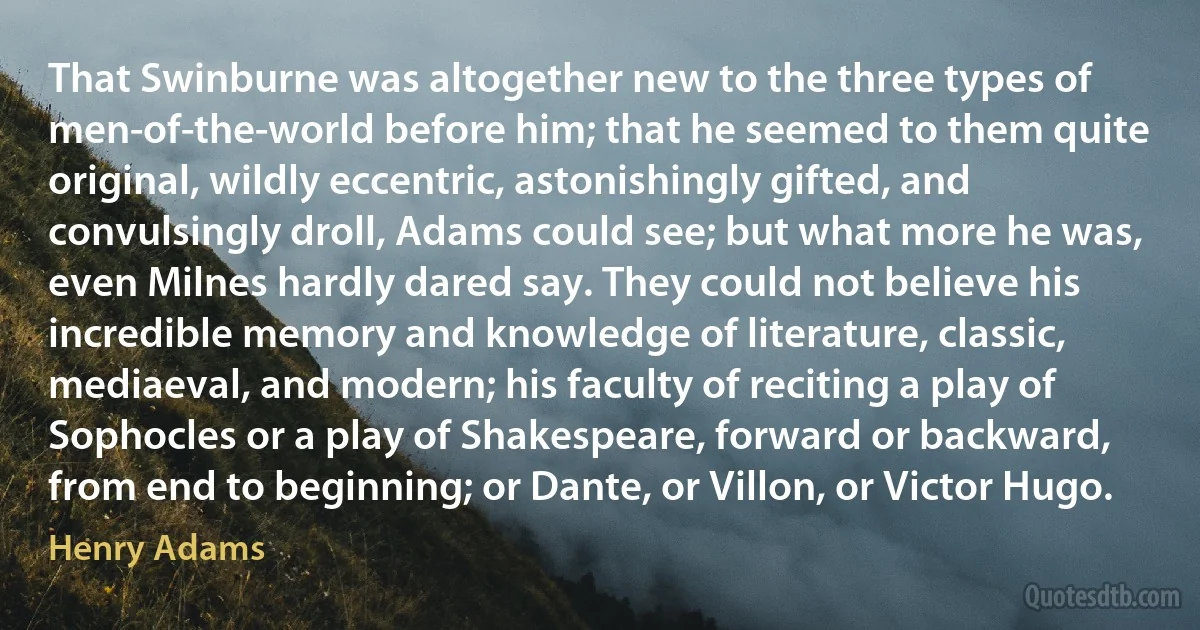Three Quotes - page 99
As Rajiv Gandhi was going past me, I got a thought in my head. I thought of how India was helping the terrorists with money, arms and military training. As these thoughts came into my head, when Gandhi was about two or three feet away from me. Yes, I felt an emotion. I despised the Indian Prime Minister. I aimed a blow with my rifle at Prime Minister Rajiv Gandhi�s back, below the shoulder.

Rajiv Gandhi
Alex Ferguson is obviously one of the most successful coaches the game has ever had. But I did find his comments about Steven Gerrard very strange. To say he is not a top player is wrong. For two or three years, Steven Gerrard was the best midfield player in the world. Even now he is playing at a high level for Liverpool and England.

Steven Gerrard
Monckton Milnes was a social power in London, and of course he himself affected social eccentricity, challenging ridicule with the indifference of one who knew himself to be the first wit in London, and a maker of men - of a great many men. A word from him went far. An invitation to his breakfast-table went farther. Behind his almost Falstaffian mask and laugh of Silenus, he carried a fine, broad, and high intelligence which no one questioned. As a young man he had written verses, which some readers thought poetry, and which were certainly not altogether prose. Later, in Parliament he made speeches, chiefly criticised as too good for the place and too high for the audience. Socially, he was one of two or three men who went everywhere, knew everybody, talked of everything.

Henry Adams
As for the White House, all the boy's family had lived there, and, barring the eight years of Andrew Jackson's reign, had been more or less at home there ever since it was built. The boy half thought he owned it, and took for granted that he should some day live in it. He felt no sensation whatever before Presidents. A President was a matter of course in every respectable family; he had two in his own; three, if he counted old Nathaniel Gorham, who, was the oldest and first in distinction. Revolutionary patriots, or perhaps a Colonial Governor, might be worth talking about, but any one could be President, and some very shady characters were likely to be. Presidents, Senators, Congressmen, and such things were swarming in every street.

Henry Adams
Among the thirteenth-century windows the Western Rose alone seems to affect a rivalry in brilliance with the lancets, and carries it so far that the separate medallions and pictures are quite lost,- especially in direct sunshine,- blending in a confused effect of opals, in a delirium of color and light, with a result like a cluster of stones in jewelry. Assuming as one must, in want of the artist's instruction, that he knew what he wanted to do, and did it, one must take for granted that he treated the Rose as a whole, and aimed at giving it harmony with the three precious windows beneath. The effect is that of a single large ornament; a round breastpin, or what is now called a sun-burst, of jewels, with three large pendants beneath.

Henry Adams
But when the good people do know, as they certainly do, that three million persons (at the least estimate) were starved to death in one year by the methods they approve, why do they still fraternize with the murderers and support the measures? Because they have been told that the lingering death of the three millions might ultimately benefit a greater number. The argument applies equally well to cannibalism.

Isabel Paterson
I have separate lists titled by characters in which I list each scene concerning that character consecutively and also the proposed scenes for that character along with notes of how I want to write it. So I take these and by them map out ahead the final draft, interlacing the scenes between various characters. Wonderful, isn't it? If I fail as a writer, I can always become a bookkeeper.
I have always been bothered because I couldn't remember details of time, place, etc. and I used to find myself either surrounded by reams of written pages, or else rewriting the same thing three or four times. This helps somewhat to alleviate that.

James Jones
In Reading [England] there is this thing called the IDR, short for "Inner Distribution Road", which is bureaucratese for "Big thing that cost a lot of money and relieves traffic problems, provided all your traffic wants to orbit the town centre permanently". It's a 2-3 lane dual carriageway that goes round the town centre. It has lots of roundabouts, an overhead section, a couple of spare motorway-like exits (that's British motorways -- y'know, the roundabout with the main road going under it), and a thing called the Watlington Street Gyratory, where you have to get in lane for your intended destination about three years and two corners before you get there with no signposting. I used to cycle along it every day to get to school, before I fell off at 35 mph. [Kids! Don't try this at home! ] I know it well. I believe it is impossible to leave Reading heading west.

Terry Pratchett
Our first introduction to Frank Withers came on December 2, 1963. In our earlier sessions, we had never been able to maintain any consistency between one sitting and another. When the Seth sessions began, one session began to instantly reinforce earlier ones. Seth specified that we have sessions twice a week, naming the evenings and the time. Sessions varied from two to three hours each. Sometimes they were longer. We have followed this schedule ever since, and sessions still continue.

Robert Butts

![When your father is alive, observe his will. When your father is dead observe his former actions. If, for three years [after the death of your father] you do not change from the ways of your father, you can be called a 'real son (xiào/hsiao)'. (Confucius)](https://cdn.quotesdtb.com/img/quotes_images_webp/78/confucius-change-dead-death-424078.webp)

